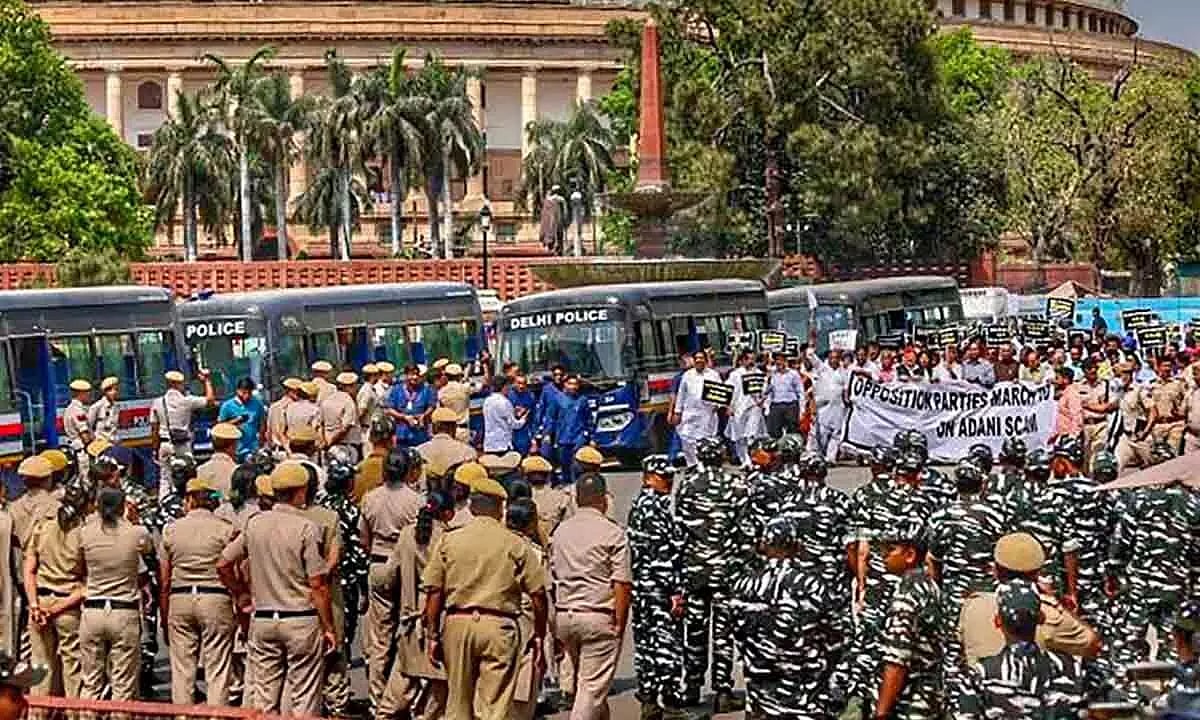They flatter to deceive themselves — and us. Opposition leaders are, once again, making noises about joining forces and cobbling together a united front to take on the Narendra Modi-led Bharatiya Janata Party (BJP) government in the general elections that are only a year away. This is reminiscent of the 2019 Lok Sabha polls too when anti-BJP parties attempted to put up a combined Opposition challenge but failed. There is little to hope that the mindset and purpose which the parties bring to the table this time around are different from what happened in 2019, though some Opposition leaders — especially Congress president Mallikarjun Kharge — would want people to believe that.
Earlier this week, Kharge and representatives of 18 parties held a joint press conference in New Delhi to announce that they would take Opposition unity further, and cornered the Modi government on issues such as the alleged malfeasance of the Adani group, price rise, and the attack on democracy. Members of Parliament marched from the Parliament to Vijay Chowk in the national capital with the Tricolour in hand. Several Opposition leaders also skipped LS Speaker Om Birla’s customary end-of-the-session tea party though National Conference’s Farooq Abdulla and Nationalist Congress Party’s Supriya Sule broke ranks.
The Opposition’s steadfastness in bringing the Modi government, especially the Prime Minister, into trouble over his proximity with Gautam Adani, and therefore having some of the dodginess of the group taint him by association, led to the latter half of the budget session being washed away. There have been other events too. All together, they make it appear as if the declaration of a unified opposition for the 2024 polls is now a matter of mere formality. However, the truth is more complex and layered; besides, it would not only be too early to hedge hopes on a unified Opposition but also premature and, perhaps, a tad foolish too.
There are more fissures and differences between opposition parties than anyone can care to remember. Congress leader Rahul Gandhi’s unflattering reference to Hindutva icon VD Savarkar led to discord between his party in Maharashtra and Uddhav Thackeray’s Shiv Sena which sees Savarkar as a demi-god. When the Aam Aadmi Party’s Manish Sisodia, former deputy chief minister of Delhi, was arrested last month over charges in what is vendetta politics, the joint letter of protest was not signed by all parties. Many more incidents abound to show that regional leaders from Mamata Banerjee and Akhilesh Yadav to Thackeray and MK Stalin, among others, are not on the same wavelength — yet. They may individually recognise the need for a unified Opposition, even for a combined opposition candidate in the 2024 polls in some constituencies, but, without exception, leaders do not appear convinced to fully commit themselves to the cause.
Then, there are internal differences that may be too great to overcome especially in the face of a central hold-all issue. For instance, Banerjee accused the Congress and CPI(M) of joining hands to defeat her candidate recently. Gandhi still does not publicly acknowledge the Thackerays though Aaditya Thackeray made an appearance at his Bharat Jodo Yatra. Indeed, parties as widely different as Janata Dal and Jan Sangh — socialists and conservative right-wingers — had joined forces in 1977 to defeat the then Prime Minister Indira Gandhi in the post-Emergency general election. The suspension of the Constitution of India, jailing of several opposition leaders and students, and the open authoritarianism of Gandhi had offered enough to cement polar opposites into a unified opposition. It is not that today’s situation has no similarities with that dark period in independent India’s history — institutional autonomy has been damaged, minorities are constantly attacked, voices questioning the government are silenced, opposition leaders are jailed, there’s wide agreement that there exists Emergency-like conditions — but there is a key difference. In letter, if not in spirit, the Modi government has not suspended the Constitution.
The Opposition today revolves around anti-BJPism as the then opposition did around anti-Congressism. This is not enough in new India. What the Opposition needs to focus on is clear: a strong message and vision for India that people can be hopeful about, a broad strategy and clear understanding between parties, willingness to overcome challenges such as lack of resources and squeezing out their channels through electoral bonds, transferring their network to other parties that need it in states, and above all, the ability to trust one another long and deep enough to take the wobbly carriage all the distance to the Parliament in May 2024. That’s a tall order.
India cannot afford another general election with a non-unified Opposition, yet that is what it may well come down to.










